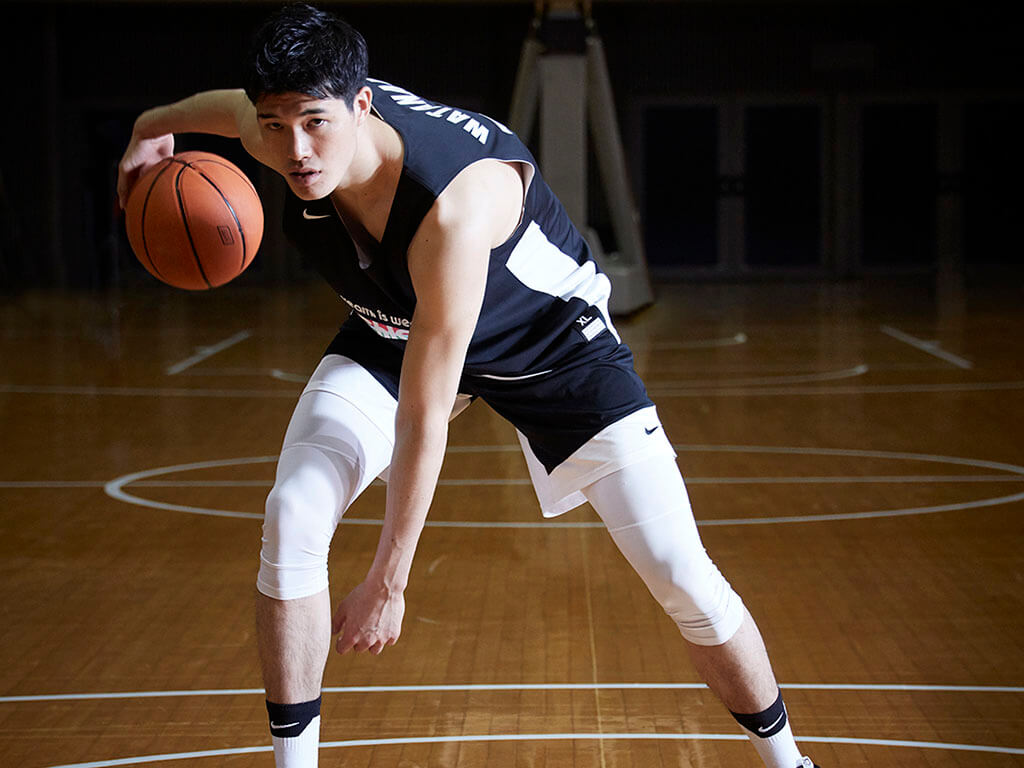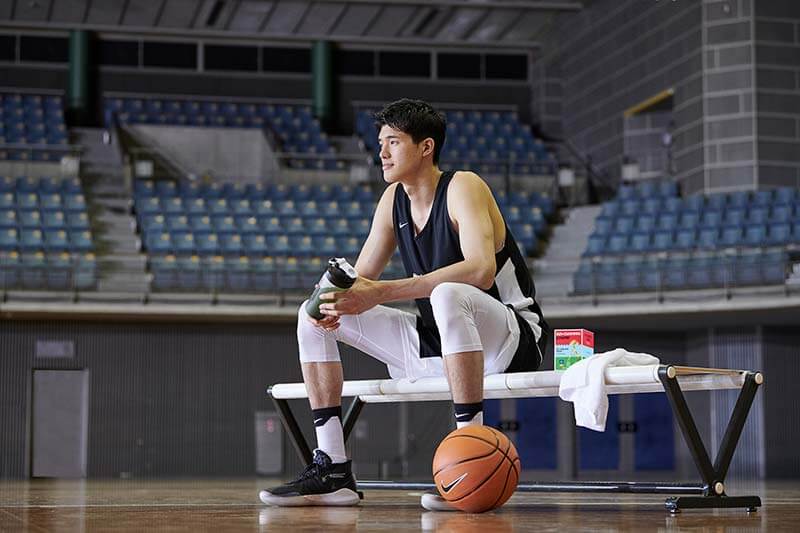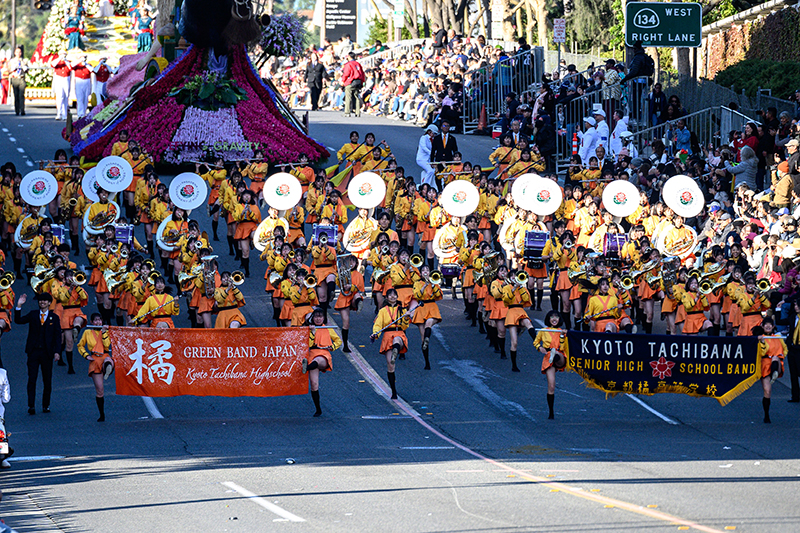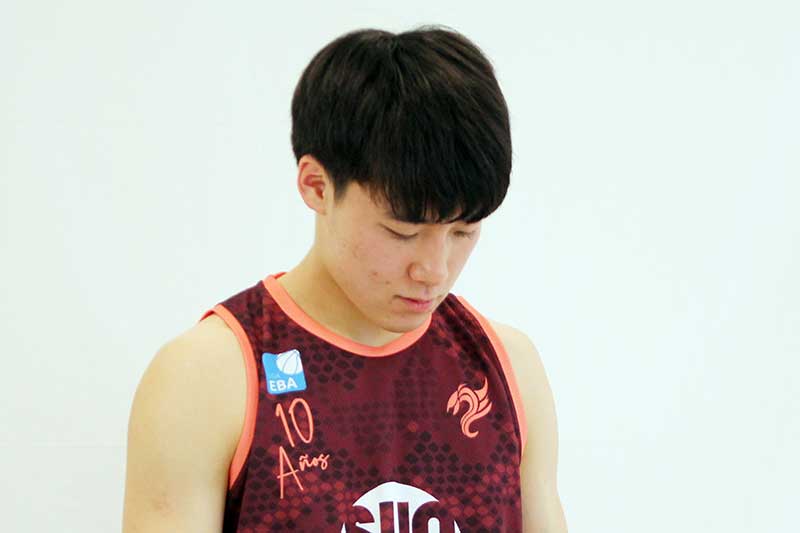Journal
サン・クロレラの取り組みや
サポートするアスリートたちのTOPICS。
Find out about Sun Chlorella's corporate activities and sponsored athletes
Yuta Watanabe
Professional basketball player
x
Futoshi Nakayama
President and CEO, Sun Chlorella Corporation

Yuta Watanabe made his life changing decision to go to the US right after graduating from high school. He has been recognized for his performance in college basketball and became the second-ever NBA player from Japan. He has reached the world’s best professional basketball league through the non-conventional route and is now a sponsored athlete of Sun Chlorella.
Read more for Yuta Watanabe’s interview with Futoshi Nakayama, a longtime fan of the NBA. Having just returned to Japan after his first season, Watanabe opens up about how he is now living his dream across the ocean, his firsthand experiences on the differences between Japan and the US, physical conditioning and nutritional management, and messages for the next generation.
Nakayama: You were only in first grade when you started playing basketball, am I right?
Watanabe: Yes. My mom was the head coach of a local basketball team, and I told her I wanted to play too, right before I started going to elementary school. That’s when it all began.
Nakayama: I’ve heard that you were raised in a family of basketball players.
Watanabe: Yes, both my parents were basketball players. I’ve never seen them play, but I’ve seen a little bit of their footage. My older sister also plays basketball, so I grew up in a family where everybody was always talking about basketball.
Nakayama: Do you think that your upbringing had an influence on why you chose to play basketball?
Watanabe: Most definitely, because the thought of playing other sports did not even occur to me. I felt that I was meant to play basketball and just followed my instincts.
Nakayama: You’ve entered the national tournament when you were still in junior high, and you were also part of a team that finished the national tournament as the runner-up when you were in high school. Then, as you graduated, a big change happens in your life.
Watanabe: Yes. I went to the US to go to college.
Nakayama: I imagine that people may have opposed your decision or questioned whether you would make it. What made you decide to give it a try nevertheless?
Watanabe: Being an NBA player was a big dream of mine ever since I was a kid, so I really wanted to play basketball in the closest place possible towards that dream. Besides, the people who’ve said negative things were people who didn’t know me in person, and I didn’t know them either. My parents, my coach from high school, my teammates at the time – everyone who was close to me were all rooting for me and supported my decision. That really gave me the push I needed to go to the US.
Nakayama: Speaking of which, Yuta Tabuse also had your back, right?
Watanabe: Yes. My father had the chance to speak with him after I decided to go to the US for college, and he’s said that I should definitely go. While many people were doubtful of my decision, hearing those words from Yuta Tabuse, a basketball legend in Japan, definitely boosted my motivation. I became more confident in myself that I was doing the right thing.
Nakayama: Playing college basketball in the US in itself is an accomplishment, but you’ve went further last year and achieved your dream of playing in the NBA. Now that you’ve actually played there, what are some of the things that you found different between Japan and the US?
Watanabe: Because the US is the best place in the world for basketball, players here have exceptionally high abilities in everything from technique to physical strength. But what I felt the most different was their attitudes toward practice. I was also very surprised at how tough the basketball drills were. The Japanese are very hardworking too and they practice a lot, probably longer in terms of hours. But in the US, we’re expected to handle intense basketball practices in a limited amount of time.
Nakayama: What do you mean exactly by “attitude”?
Watanabe: For example, we play some 5-on-5 games among our teammates during practice, and sometimes we get a little rough trying to stop the opponent, which easily breaks into a fight. This happens all the time, and the rest of us – the coaches, the teammates – are often times desperately trying to pull them apart. That’s how intense we are at practice – so serious that it turns into a fight, and that’s what I mean by “attitude” – passion. That level of passion during practices are not something I’ve experienced in Japan, so it was in a sense a culture shock for me.
Nakayama: You mean, why would you go so far, it’s just practice?
Watanabe: Yes. But when practice is over, the two who’ve just fought so hard a minute ago are like chatting and laughing like nothing’s happened. I was impressed by that mentality of “what happens on the court, stays on the court.”
Nakayama: They’re serious about what they do and that’s why they get into fights sometimes, but that doesn’t mean they don’t get along.
Watanabe: We’re all on the same page that we’re doing it for the good of ourselves as professional basketball players as well as the team, so what happens on the court never interferes with our personal relationships.
Nakayama: What were you most surprised or shocked at in your first year as an NBA player?
Watanabe: Since I was still in Japan, I knew that they’d be really strong, in terms of technique and motor skills, but when I actually played with them in person, they were beyond what I imagined. I was stunned every time someone makes these amazing moves, like wow, you’d actually jump from that distance and actually make a dunk? Or, they’d easily score points from impossible body positions – there’s just been so many of them.
Nakayama: While you were shocked, were you also fulfilled with that fact that now you’re playing among those amazing players?
Watanabe: No doubt. Every minute, every second that I’m on the court that I’ve always dreamed of – I’m living my dream right now. For example, I got to play against my hero Kevin Durant in the final game of this season. But I certainly felt that I’ve got lots of space for improvement this first year, so I’m not satisfied with my performance nor do I have a sense of accomplishment. I’m motivated now more than ever, and I’m reminded that I need to be ambitious to get better.
Nakayama: What is your number one challenge?
Watanabe: I actually have three. I need to build my body bigger because I’m still on the thin side, increase my physical strength, and become a better shooter. I played in 15 NBA games this season, and I felt that I’ve missed shots that I normally wouldn’t have, so I really feel that I should raise my shooting percentage to the NBA level.
Nakayama: Speaking of physical strength, the current Memphis Grizzlies coach Tayshaun Prince was also like you during his playing days – left-handed, tall, and thin. He also had a difficult time at first because his ratings were low compared to his actual talent. However, he gradually managed to increase his playing time, and later, he was in the starting lineup of a team that won. I imagine that it’s a big deal for you that a former player like Tayshaun Prince is now on your team as a staff member.
Watanabe: Yes, of course I’ve been watching him play since I was a kid, and someone has even told me that my body type is very much like him. He’s given me advice that first year is all about practice after practice and getting better day by day. He understands that first years are tough, so he always reminds me how important it is to keep practicing.
Nakayama: And about your other goal of improving your shooting skills – Nick Van Exel is also one of your coaches. He was especially skilled at long range shooting during his playing days. What kind of conversations have you had with him?
Watanabe: Nick has told me that my arms get lazy when I get tired. He’s pointed out repeatedly that I’m not straightening my arms enough, so I’m more cautious of that. There are three lefties in the Grizzlies right now – Nick, myself, and another player named Mike Conley – and he always used to say, “Mike’s second, Yuta’s third, and of course I’m number one.”
Nakayama: Nick has been very confident since his playing days.
Watanabe: Every once in a while, we play games of basketball shooting and I always admire how he makes these shots like it’s the easiest thing in the world.
Nakayama: You’re on a two-way contract (in basketball, a contract in which a player generally plays for the G League team but can spend up to 45 days in the NBA; each team can have up to two two-way contract players per season) with the Memphis Grizzlies and its NBA G League affiliate Memphis Hustle, and you’re playing for both teams. You’re sometimes told which games to play the day before, and I imagine that it must be challenging to maintain your mental toughness. How do you keep up with your physical fitness, your health, and your diet?
Watanabe: Well, we have a chef on our team. And remaining healthy is a part of our job as a professional athlete. If I’m not feeling too well, that affects my performance, so I’m trying to be really professional about it and maintain my physical condition on my own.
Nakayama: What do you do exactly?
Watanabe: As of my diet, I consciously eat a lot and be aware of my nutritional intake. I also sleep enough too. We’re busy every day, playing a lot of games, so I make sure I’m doing the basics well.
Nakayama: What else is a part of your routine other than paying attention to what you eat and how much you sleep?
Watanabe: I also take supplements in order to maintain a balanced diet and keep my body fit and healthy. Sun Chlorella has been a great addition to my diet.
Nakayama: I’ve heard that you’ve been taking our product from before our sponsorship agreement. Is that true?
Watanabe: Yes! I happened to be taking them ever since a friend of mine recommended them to me. My parents also started taking them around the same time as I did, and they were also really happy to hear about our agreement.
Nakayama: Hearing that from you makes me feel very happy too. Have you had any positive changes since you’ve started taking chlorella?
Watanabe: Definitely. We play a lot of games right now and because the US is huge, travelling long distances can be quite challenging. I’m also on a two-way contract, so I feel like in a sense I’m having a tougher time compared to my other teammates. It’s been really good for me to be able to maintain my health so easily by taking Sun Chlorella.
Nakayama: You’re right in the middle of building your physical strength to fight with and against other NBA players.
Watanabe: That’s right! This sponsorship agreement really did happen in just the right timing for me.
Nakayama: Are there anything else that you’ve noticed, other than in terms of your nutritional management?
Watanabe: Well, I’ve personally noticed that I don’t really feel tired anymore during games. There’s been hardly a time when I felt that I was overworking my body despite the high workloads and being on a busy schedule for so long. That’s why I was convinced that that’s because I’m taking Sun Chlorella.
Nakayama: I’ve very happy to hear that. Would you mind telling us your way of taking them?
Watanabe: I mix Sun Chlorella ‘A’ Powder with a glass of water, and usually I drink it before I go to bed. My first impression was how easily drinkable it is – and I’m not saying this because you’re the president of the company. I know that some people don’t really like plant-based supplements, but truly, I didn’t mind the taste of it at all from the get-go. I mean, I’m drinking it because I like it, not because it’s good for me and I’m forcing myself to drink it.
Nakayama: Thank you. I do remember feeling impressed by the amount of movement this sport involves, from when I went to see the Hustle play a game in Memphis this March. And I remember you kept up with your pace throughout the game, so in terms of stamina, I think you’re already there at the NBA level. You’ve mentioned earlier about how you’re working on strengthening your body, and I’d be happy if you would continue taking our product, and if we could assist you with nutritional management and physical fitness that way.
Nakayama: Do you have any advice or messages to young basketball players in Japan who are dreaming of playing in the US someday?
Watanabe: If you’re thinking of going to the US, I’d say go for it, a hundred percent. Of course, you’re going to face lots of difficulties that you wouldn’t have otherwise in Japan. Hang in there until you overcome those challenges, and you’ll be growing by leaps and bounds – far greater than if you’ve stayed in Japan.
Nakayama: You’ve been taking interviews in the US on your own, without a translator. You’ve learned how to speak English during your four years in college, so if you have any advice on mastering the language as well, please tell us.
Watanabe: I definitely had a very rough time during my first year in college. Colleges in the US won’t let you play basketball unless you get good grades, so if you can, you should definitely start learning English right now. Even if you don’t know yet whether or not you’ll go to a different country for basketball, there’s not a single disadvantage for being able to speak English. Besides, if you’ll be playing in international matches, you’ll have to be able to communicate with the referee in English.
Nakayama: You’re right that you’ll have more options if you can speak English, and you might have a higher chance of joining the NBA that way.
Watanabe: For me, the number one thing that people told me before I went to the US was, “how can you keep up in college if you can’t speak English?”
Nakayama: Speaking of English fluency, there’s a culture of “trash-talking” in the NBA, where players would insult the opponent by using foul language in press conferences and even during games. That’s something that we don’t have in Japan, and I imagine you had to get used to that too. What are your thoughts on that?
Watanabe: At first, I couldn’t understand what they were saying at all, so I was like, “oh, they’re saying something, but I don’t know what.” But as I gradually understood the language, I’d recall those moments and realize, “oh, that’s what they were saying.” But I think that if they’re trash-talking me, that’s because they feel something in me that they respect about, because you wouldn’t say anything to someone you don’t feel is a threat. If the crowd boos at you when you’re playing in the home field of your opposing team, it means that you’re a threat, so it’s okay to be confident in yourself and enjoy the fact that they’re watching out for you.
Nakayama: I see. In that case, I look forward to seeing you trash-talking one day!
Watanabe: I’m not the type who starts it though … but I do occasionally talk back if someone trash-talks me. I guess we’ll find out next season!
(Professional basketball player)
Yuta Watanabe was born in Mikicho, Kagawa Prefecture, on October 13th, 1994. He is 206 cm tall, weighs 92 kg, and plays the shooting guard and small forward positions. He was the first-ever high school student to be on the Japanese national team while he attended Jinsei Gakuen High School. Watanabe went to the US to enroll in The George Washington University, and was a member of his college basketball team that became the runner-up in the National Prep School Invitational in 2014 and the winner of the National Invitational Tournament in 2016. He was named the Atlantic 10 Defensive Player of the Year in 2018. After participating in the 2018 NBA Summer League, Watanabe signed a contract with the Memphis Grizzlies and became the second-ever Japanese player in the NBA.
-
Sun Chlorella ‘A’ Powder is the only NSF Certified for Sport® product in the green category. Yuta Watanabe is pleased with how it’s safe for him to drink too.



